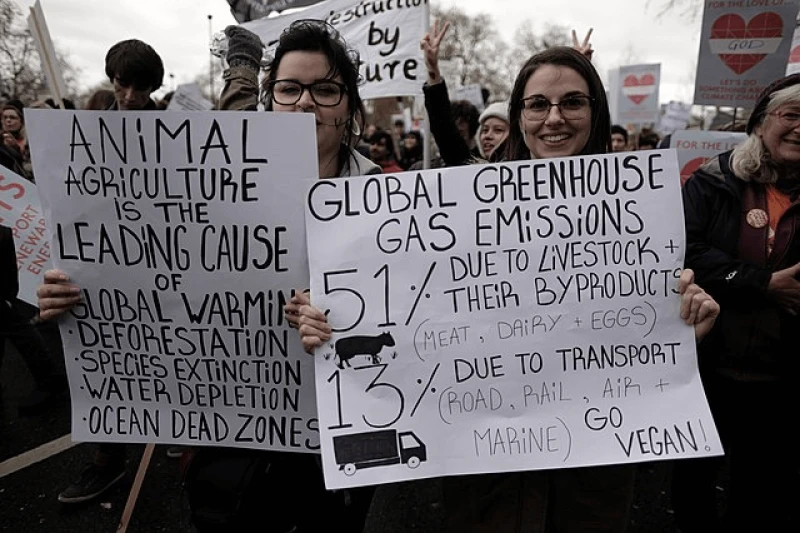Viewpoint: Why we should be skeptical of ‘climate-friendly’ grocery store claims
Viewpoint: Why we should be skeptical of ‘climate-friendly’ grocery store claims


Meat eaters are about to have a new option in the beef aisle. Along with cuts of meat labeled as organic, GMO-free, grass-fed, or what have you, consumers will now be able to buy beef that’s certified “climate-friendly.” In late 2021, the U.S. Department of Agriculture (USDA) launched a verification program that allows meat producers to label their product “low-carbon” if it meets certain environmentally-conscious criteria. And just last month, Tyson Foods and Schweid & Sons, in partnership, began selling the first burger to earn that designation.
The program isn’t just useless; it could even harm the environment further. The low bar to certification could de-incentivize producers from making bigger changes and leading consumers to complacency. And even if the requirements for certification were better than average for beef products, the label “climate-friendly” would still be seriously misleading. Beef is by far the least climate-friendly food a person can eat due to its levels of greenhouse gas emissions; according to one study, producing a kilogram of beef contributed over 22 times more to the climate crisis than producing a kilogram of rice, and 63 times more than a kilogram of wheat. Not to mention the myriad other ways it negatively impacts the environment. And since brands generally aren’t required to print the relevant numbers, shoppers can’t even compare products to figure out which are the lesser of the evils.
This is an excerpt. Read the original post here

 | Videos | More... |

Video: Nuclear energy will destroy us? Global warming is an existential threat? Chemicals are massacring bees? Donate to the Green Industrial Complex!
 | Bees & Pollinators | More... |

GLP podcast: Science journalism is a mess. Here’s how to fix it

Mosquito massacre: Can we safely tackle malaria with a CRISPR gene drive?

Are we facing an ‘Insect Apocalypse’ caused by ‘intensive, industrial’ farming and agricultural chemicals? The media say yes; Science says ‘no’
 | Infographics | More... |

Infographic: Global regulatory and health research agencies on whether glyphosate causes cancer
 | GMO FAQs | More... |

Why is there controversy over GMO foods but not GMO drugs?

How are GMOs labeled around the world?

How does genetic engineering differ from conventional breeding?
 | GLP Profiles | More... |

Alex Jones: Right-wing conspiracy theorist stokes fear of GMOs, pesticides to sell ‘health supplements’




 Viewpoint — Fact checking MAHA mythmakers: How wellness influencers and RFK, Jr. undermine American science and health
Viewpoint — Fact checking MAHA mythmakers: How wellness influencers and RFK, Jr. undermine American science and health Viewpoint: Video — Big Solar is gobbling up productive agricultural land and hurting farmers yet providing little energy or sustainabilty gains
Viewpoint: Video — Big Solar is gobbling up productive agricultural land and hurting farmers yet providing little energy or sustainabilty gains Fighting deforestation with CO2: Biotechnology breakthrough creates sustainable palm oil alternative for cosmetics
Fighting deforestation with CO2: Biotechnology breakthrough creates sustainable palm oil alternative for cosmetics Trust issues: What happens when therapists use ChatGPT?
Trust issues: What happens when therapists use ChatGPT? 30-year-old tomato line shows genetic resistance to devastating virus
30-year-old tomato line shows genetic resistance to devastating virus California, Washington, Oregon forge immunization alliance to safeguard vaccine access against federal undermining
California, Washington, Oregon forge immunization alliance to safeguard vaccine access against federal undermining The free-range chicken dilemma: Better for birds, but with substantial costs
The free-range chicken dilemma: Better for birds, but with substantial costs ‘You have to treat the brain first’: Rethinking chronic pain with Sanjay Gupta
‘You have to treat the brain first’: Rethinking chronic pain with Sanjay Gupta
